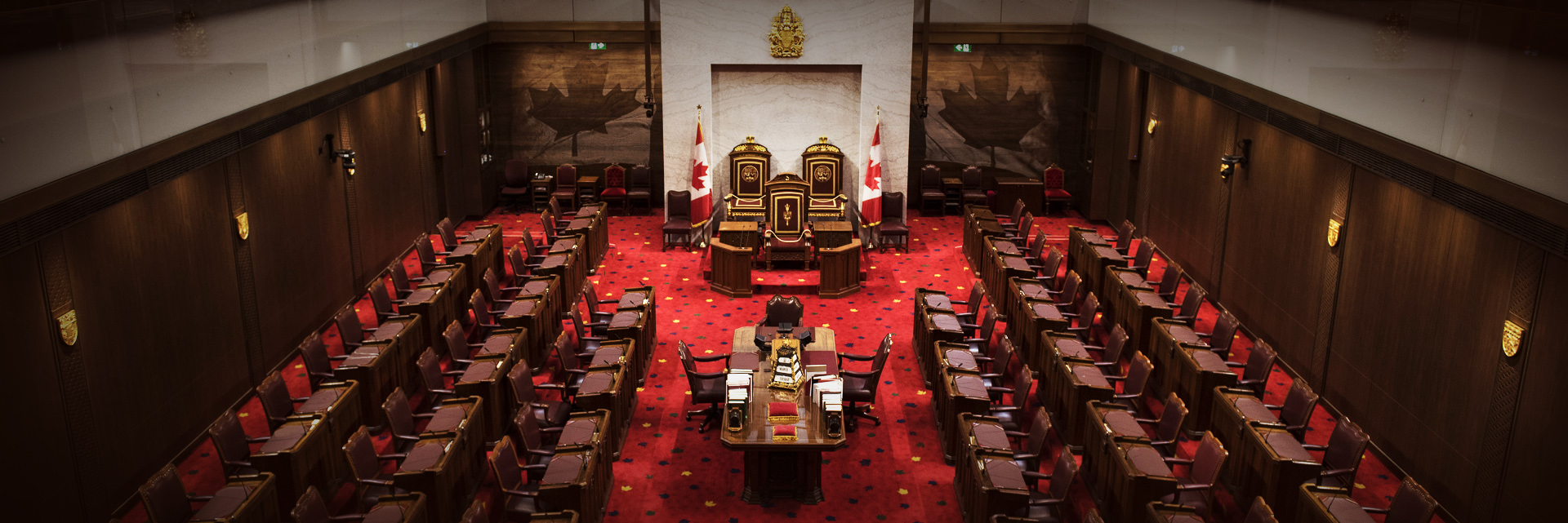
National Security Bill, 2017
Message from Commons--Motion for Non-Insistence Upon Senate Amendments--Motion in Amendment--Debate
June 18, 2019
Therefore, honourable senators, in amendment, I move:
That the motion be not now adopted, but that it be amended:
1.by replacing the words “amendments 1 and 2” by the words “amendment 1”;
2.by deleting, in the English version, the word “and” at the end of the first paragraph; and
3.by replacing the second paragraph by the following:
“That the Senate insist on its amendment 2, to which the House of Commons has disagreed;
That, pursuant to rule 16-3, the Standing Senate Committee on National Security and Defence be charged with drawing up the reasons for the Senate’s insistence on its amendment;
That the committee present its report with the reasons pursuant to this order no later than Friday, June 28, 2019; and
That once the reasons for the insistence have been agreed to by the Senate, a message be sent to the House of Commons to acquaint that house accordingly.”.
It is moved by the Honourable Senator Housakos, seconded by the Honourable Senator Smith, that the motion be not now be adopted — may I dispense?
On debate?
Colleagues, I rise today to speak on the matter of the Government’s response to the amendments made by the Senate to Bill C-59, An Act respecting national security matters, and, of course, to move the amendment.
I want to begin by noting that what we have before us is an all too typical Government response to amendments made in the Senate.
The Senate made four amendments to Bill C-59. At least three of the four amendments reflected what the Senate Standing Committee on National Security and Defence heard from very informed witnesses in relation to this legislation.
But, as is typical, the Government has decided to only accept two of those amendments - specifically those which are the least disruptive to the Government’s core agenda when it comes to this bill.
One amendment was proposed by Senator Gold, the bill’s sponsor. When Senator Harder spoke on the Government’s response last week, he stated the following in relation to that amendment: He said:
[The amendment adds] a blank schedule … in relation to Part 1.1 of Bill C-59, which enacts the avoiding complicity in mistreatment of foreign entities act. Adding this schedule corrects an important technical issue by allowing the Governor-in-Council to add departments or agencies in the future that may have to comply with the act.
In other words, it is an amendment which the Government itself proposed, to correct its own drafting error.
Not exactly earth shattering.
The other amendment is more substantive and was proposed by my colleague, Senator Dagenais. It will require a parliamentary review three years after receiving Royal Assent, rather than the original five. This is a more important amendment since hopefully there will be another government in power in three years which will be able to correct some of the weaknesses in this legislation.
The current government is, of course, hoping that it will still be in power in three years and then be able to simply ignore this provision.
I now come to the amendments that the government has chosen to reject. These are ones that, for lack of a better term, are seen to interfere with the bill as originally introduced in the Senate.
One was proposed by Senator McPhedran. While I may disagree with the objective of her amendment, it does reflect concerns some certain witnesses raised about the scope of the role of the new Intelligence Commissioner.
The Government has dismissed that amendment and I am sure that senators opposite can speak to their views on that rejection.
What concerns me more, however, is the government’s decision to also reject the amendment proposed by my colleague, Senator McIntyre. In my view, the rejection of this amendment directly contradicts the Government’s own very public pledge to fight the advocacy of terrorism and violence online.
Just a few weeks ago, Foreign Affairs Minister Freeland said the following at the United Nations:
Today, hatred is increasingly spread through the internet; in online forums and on social media. We must be aware of this and work to stop it.
I would argue that the Government had its chance in relation to the amendment proposed to this legislation but now has effectively decided to do nothing.
To remind senators, what Bill C-59 does is to eliminate the offence of “advocating or promoting terrorism” and instead replace it with the offence of “counselling to commit” a terrorism offence.
The Government has argued that the current provision in the law is unusable and therefore replacing it with a more specific offence of counselling to commit a terrorism offence would lead to more charges that could be defended in court.
However, just in September of last year, the Globe and Mail reported that Crown prosecutors in Montreal were using the very provisions in the law, claimed by the Government to be “unusable” to remove terrorist propaganda from the internet.
Former Crown Attorney Scott Newark has said that the removal of the offence of advocacy and promotion of terrorism will:
. . . likely reduce the ability of law enforcement to use the judicially authorized terrorism-propaganda ’takedown’ tool.
When the Senate National Security and Defence Committee met to consider Bill C-59, this same concern was raised by witnesses appearing before the Committee.
Mr. Shimon Fogel, Chief Executive Officer, Centre for Israel and Jewish Affairs stated at committee:
. . . we are deeply concerned by one key aspect of the bill: the amendment to the Criminal Code provision outlining what is now known as advocacy and promotion of terrorism. Bill C-59 will redefine this offence as counselling terrorism.
Mr. Fogel further stated that:
As currently worded, the new offence would apply to ’every person who counsels another person to commit a terrorism offence’. This wording suggests that the offence exclusively pertains to one who counsels another specific individual.
Consistent with what witnesses said in the House Committee, Mr. Fogel cautioned that this gap could create a potential loophole in the law.
There was a risk that a defendant could counsel social media followers to commit acts of terrorism and then argue that they did not directly counsel a specific person. To address this gap, Mr. Fogel proposed an amendment to ensure that “terrorism counselling” would explicitly apply whether one counselled on a specific individual or whether one counselled broader audiences to commit acts of terrorism.
My colleague, Senator McIntyre, picked up on this very useful proposal and proposed an amendment to do just that. The amendment was supported by the majority of senators on the committee and was then ultimately passed by the Senate as a whole.
Now we have the Government’s response.
Senator Harder said last week that the government is of the view that the amendment could have unintended consequences by creating inconsistencies in criminal law and that the text is inconsistent with the proposed counselling offence.
This was precisely the argument that was also made by Senator Gold, the bill’s sponsor.
Senator Gold argued that the amendment was unnecessary because even under current law, counselling does not require an accused to know the identity of those he counsels.
That, evidently, is not self-evident, since, as former Crown Attorney Scott Newark stated, the removal of the offence of advocacy and promotion of terrorism will, in his words:
. . . likely reduce the ability of law enforcement to use the judicially authorized terrorism propaganda “takedown” tool . . . .
Senator Gold also argued, just as the government through Senator Harder now argues, that the proposed amendment would confuse the current law in that the Criminal Code will now potentially have more than one definition of “counselling to commit” an offence.
This issue was referenced by my colleague Senator Frum when she spoke to this bill at third reading. She asked a very important question when she spoke:
. . . if such a risk does exist, why would the government not amend potentially conflictual sections of the code to ensure the definitions are either broader or at least sufficiently consistent in the context of the specific offences to which they apply?
She asked why the government and its supporters consistently place their emphasis on finding reasons not to tighten the law, rather than actually looking for tools that will address real security and tighten public safety risks.
If the government wants to prioritize real or imagined constitutional risks and not strengthen the law, why then do government ministers stand up at the United Nations, as Minister Freeland did recently, to proclaim that they are committed to taking firm action to stop the online promotion of hate and violence? They clearly have no intention of making this a real priority, yet they never miss an opportunity to proclaim that they do, to pontificate, which this government so often does.
In my view, the Senate should clearly say to the government that its response on this amendment is unacceptable.
In today’s world, the propagation of online terrorist propaganda is the fuel for terrorist attacks. It has fuelled attacks all over the world, including in Canada. I believe that we need to make combatting it a legislative priority. I only wish that the government shared this particular point of view.
To correct at least one flaw in this bill, I believe the Senate must insist on Senator McIntyre’s amendments. I hope, colleagues, you will all support the amendment I put forward today. Thank you.
Are honourable senators ready for the question?
It was moved by the Honourable Senator Housakos, seconded by the Honourable Senator Smith, that the motion be not now adopted but that it be amended by replacing — may I dispense?
Is it your pleasure, honourable senators, to adopt the motion?
All those in favour of the motion will please say “yea.”
All those opposed to the motion will please say “nay.”
In my opinion, the “nays” have it.
Do we have an agreement on a bell?
One hour.
The vote will take place at 4:02 p.m.
Call in the senators.

